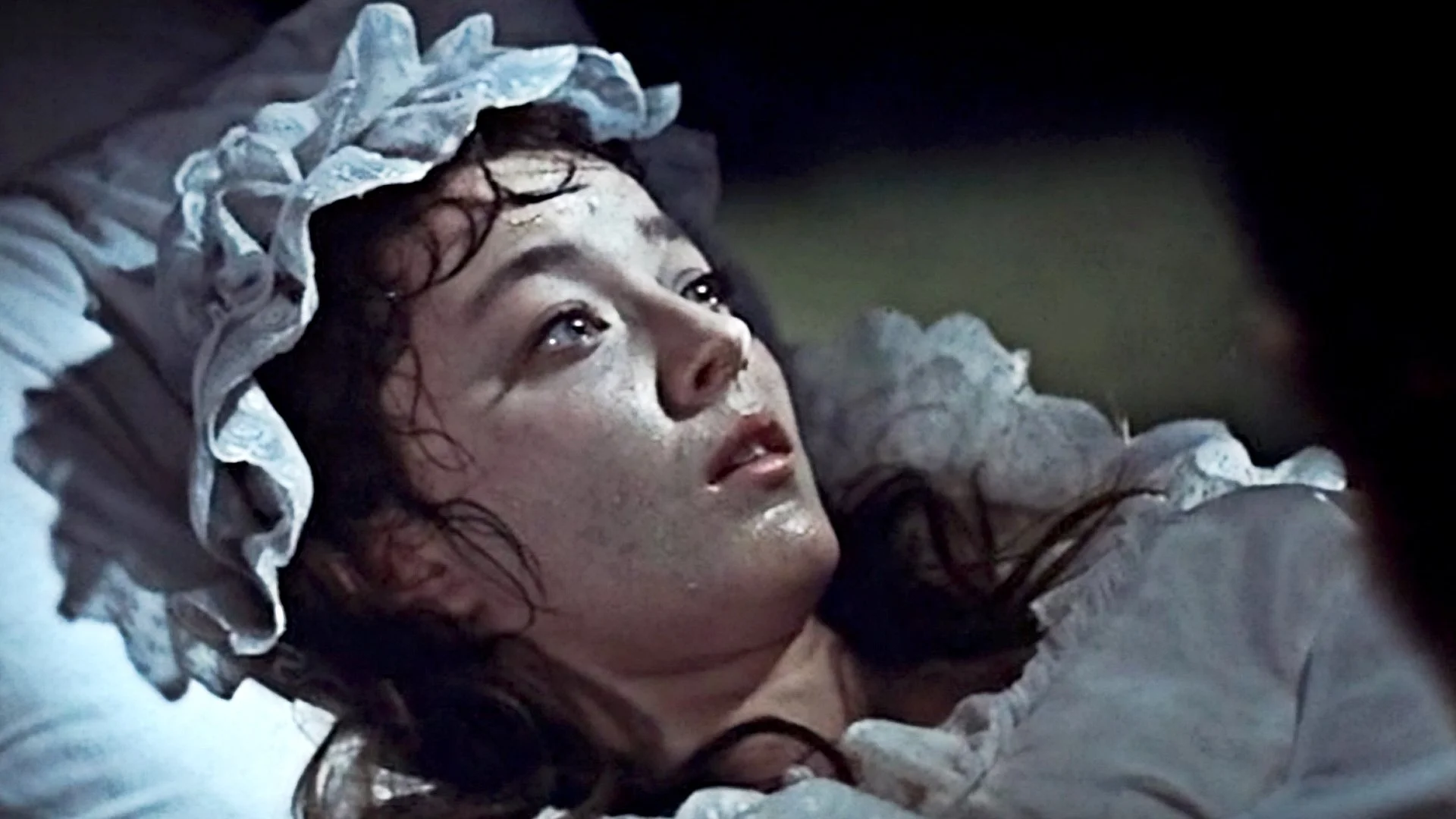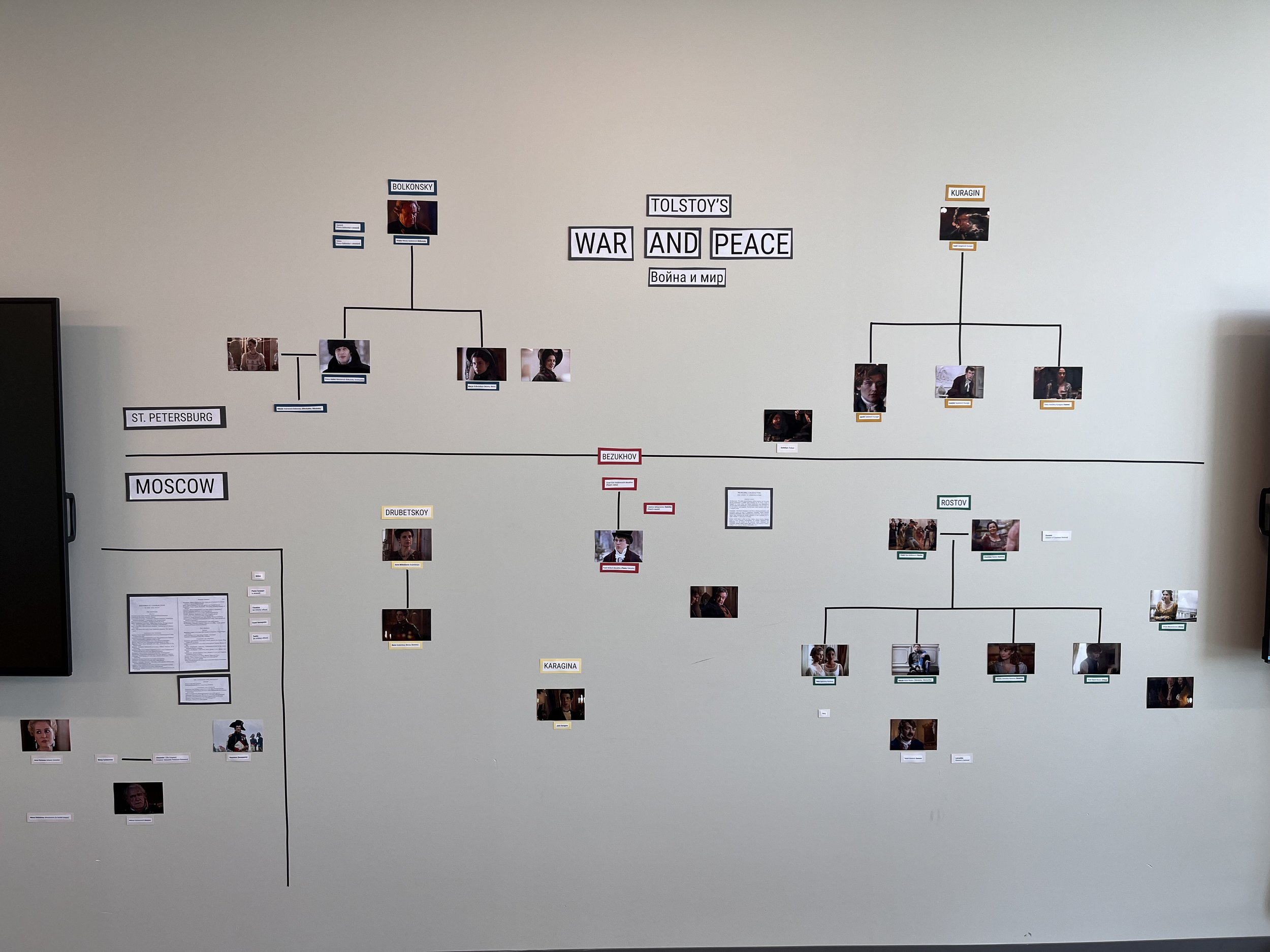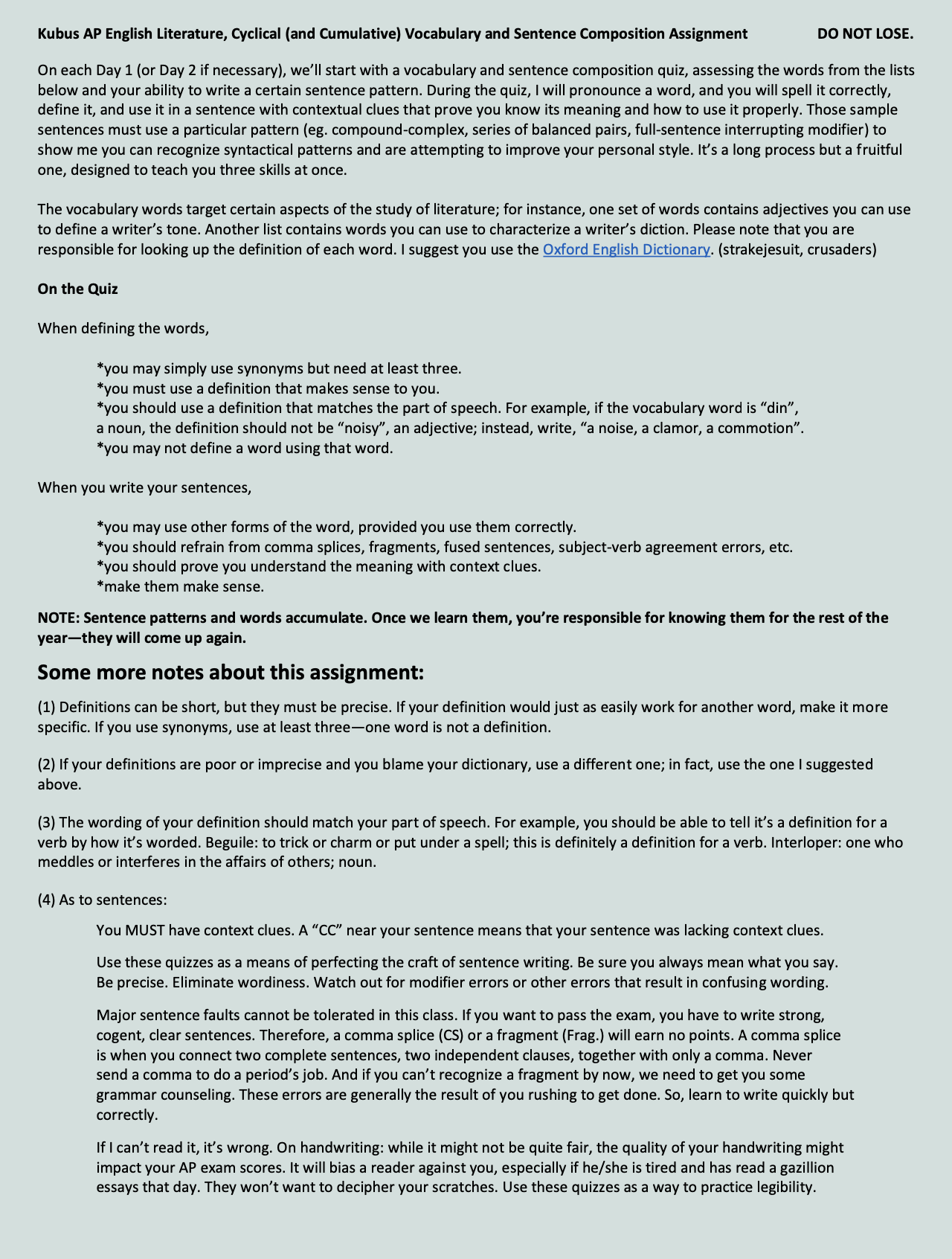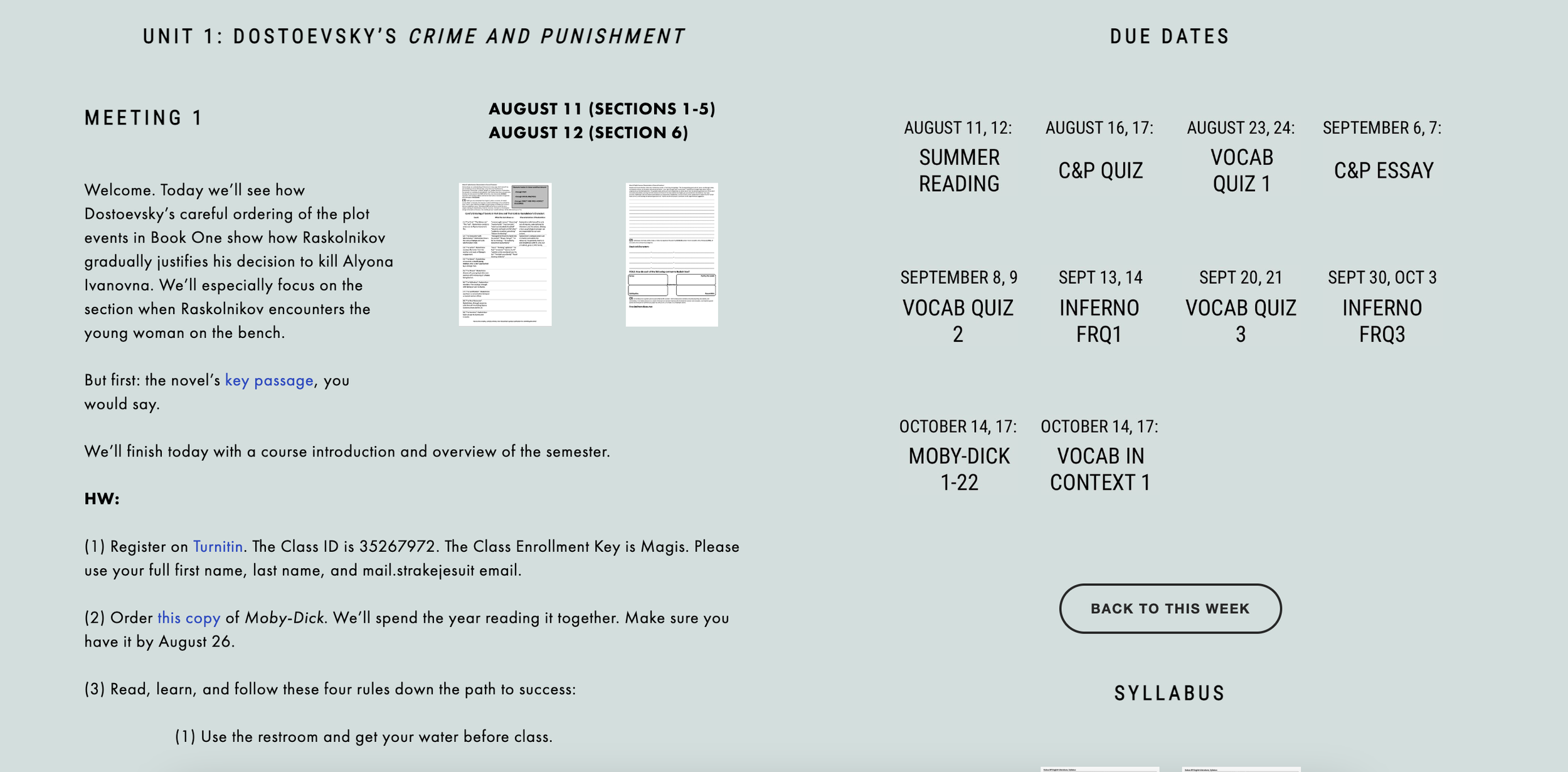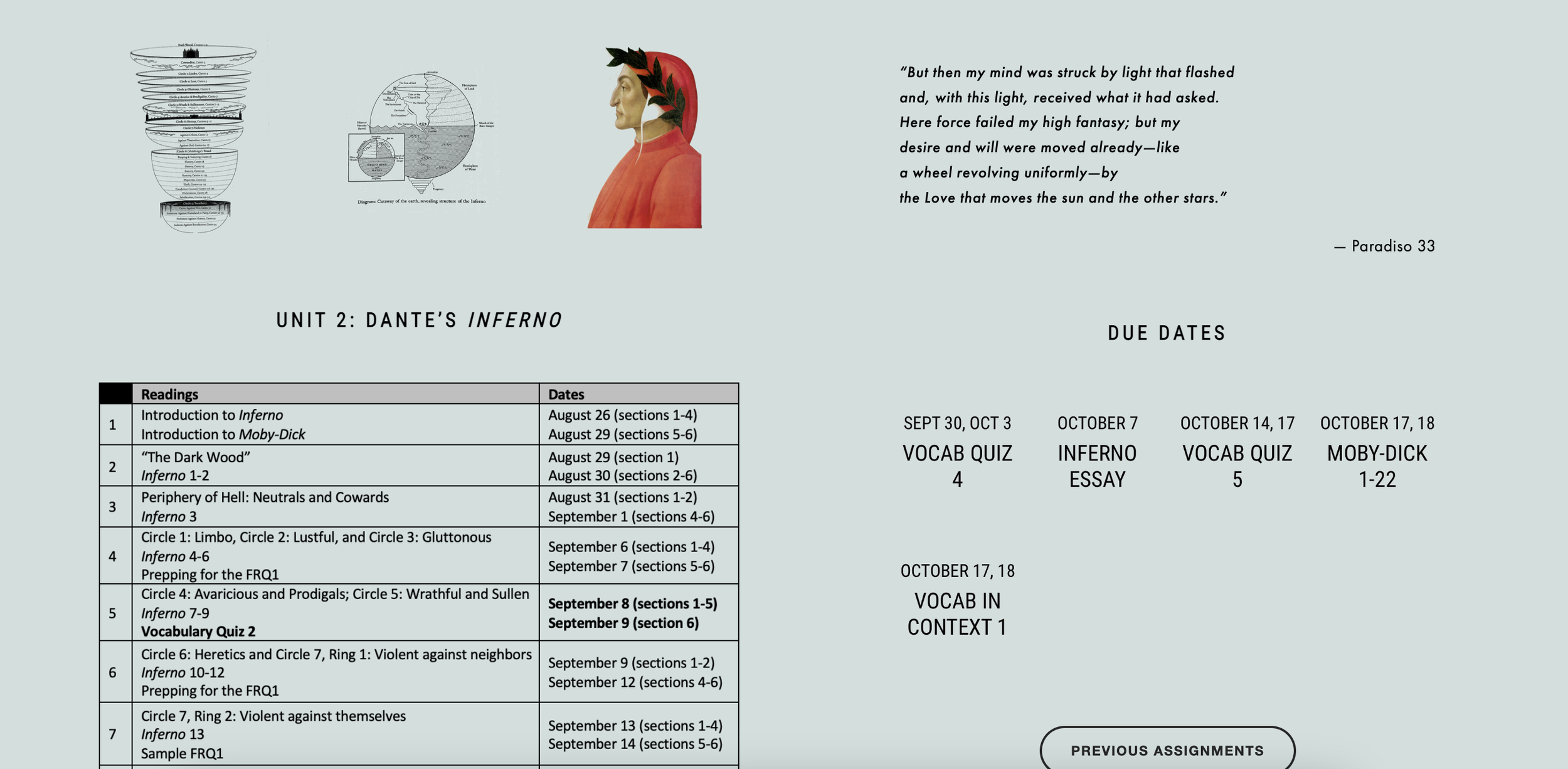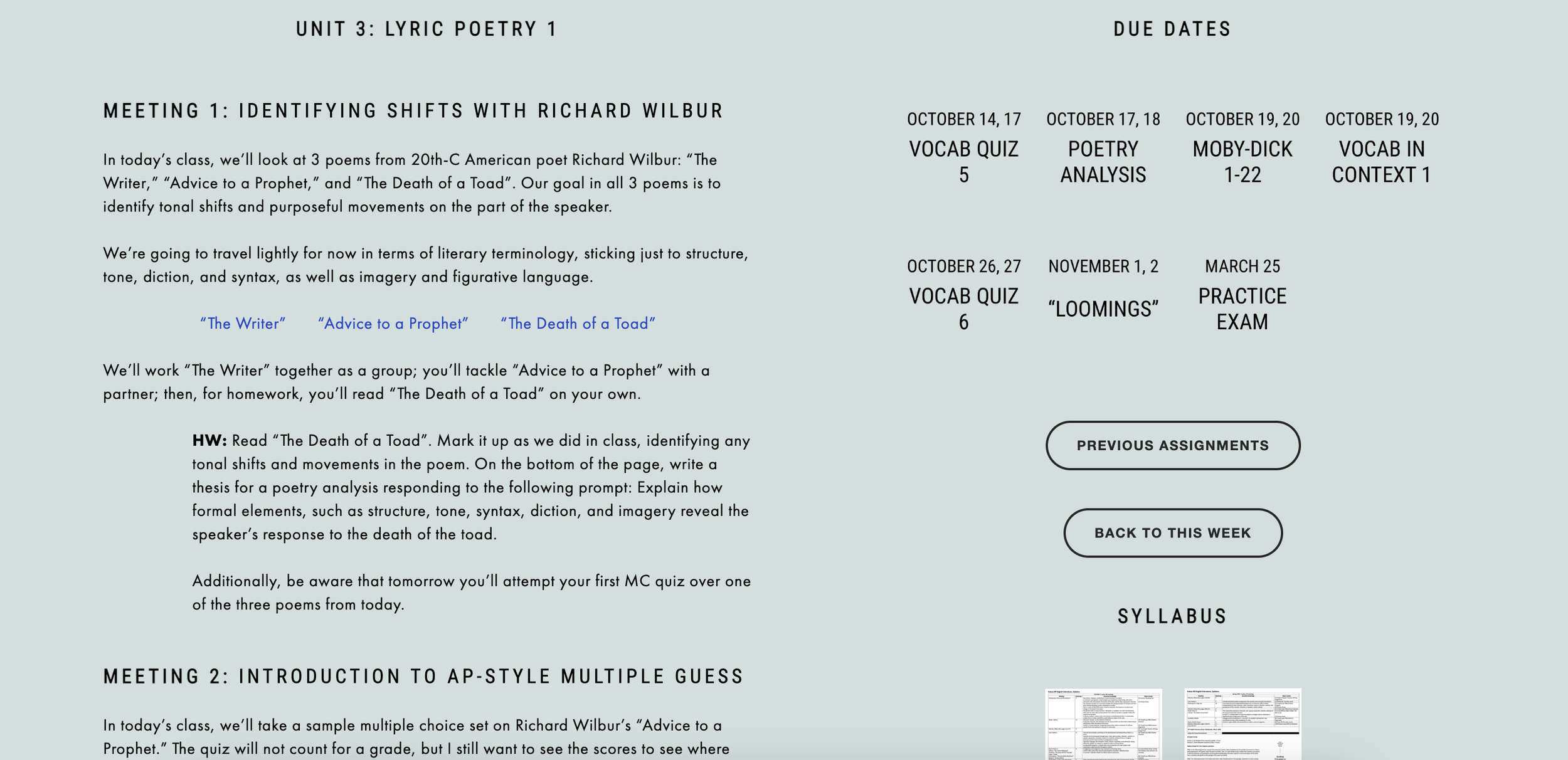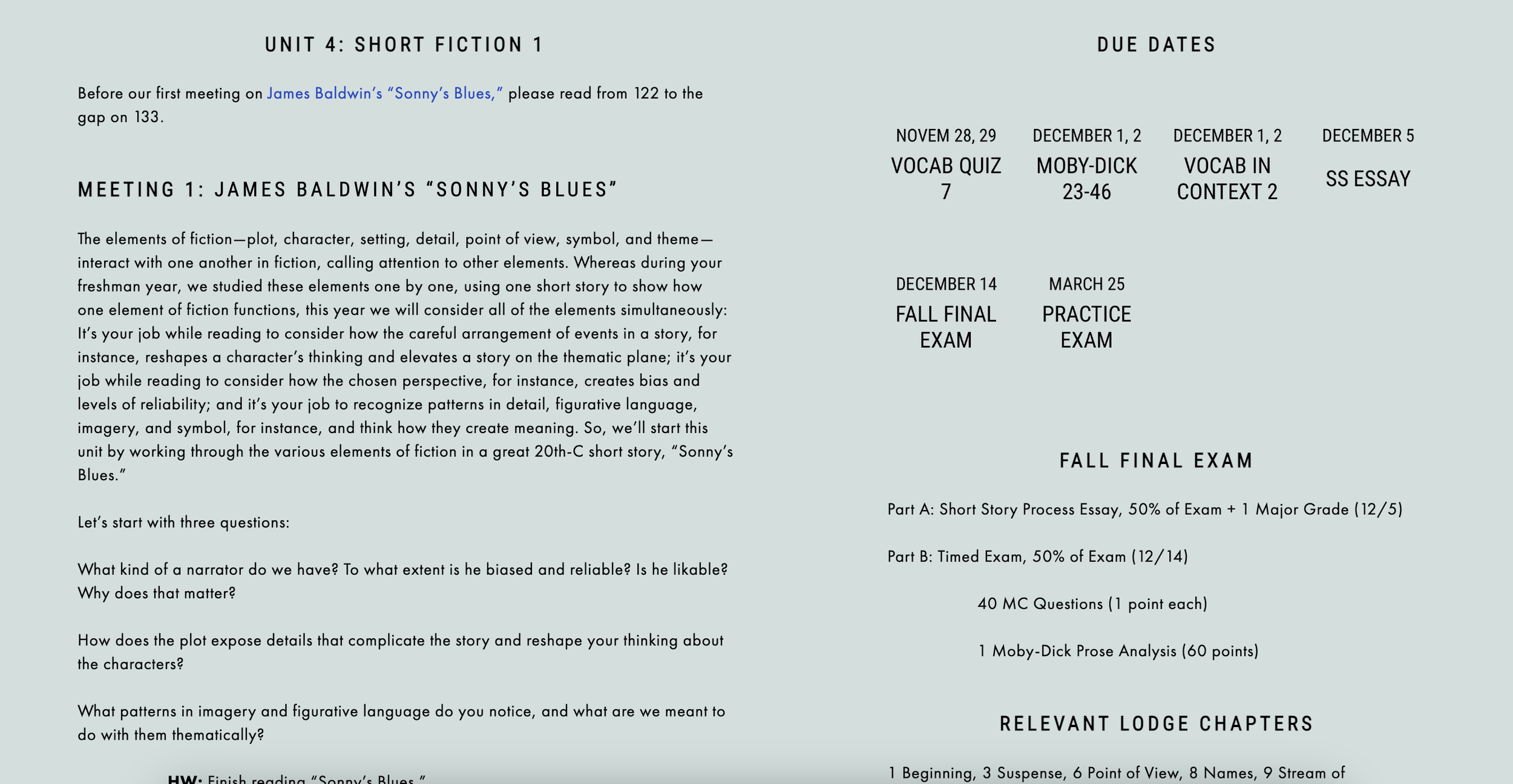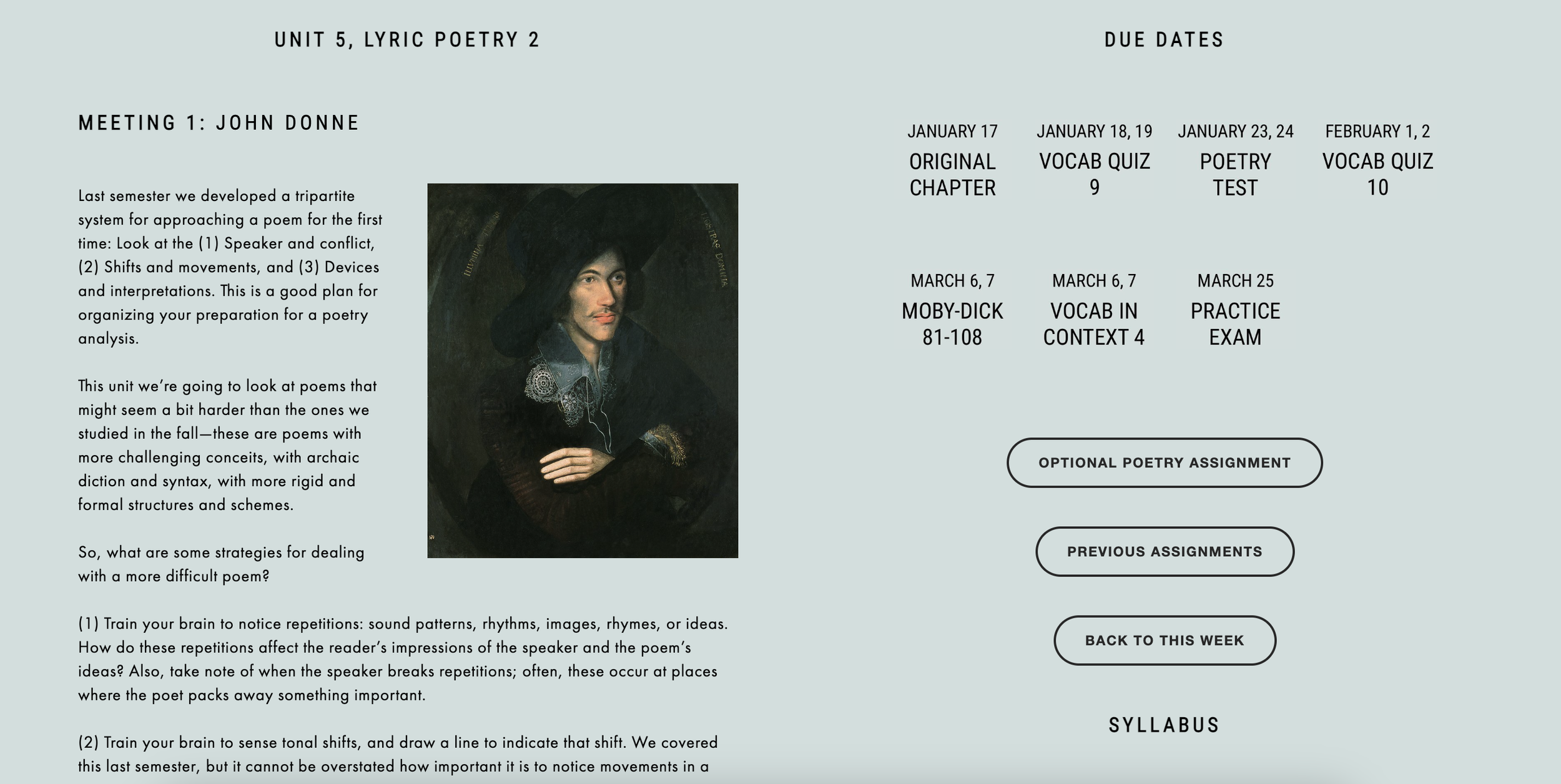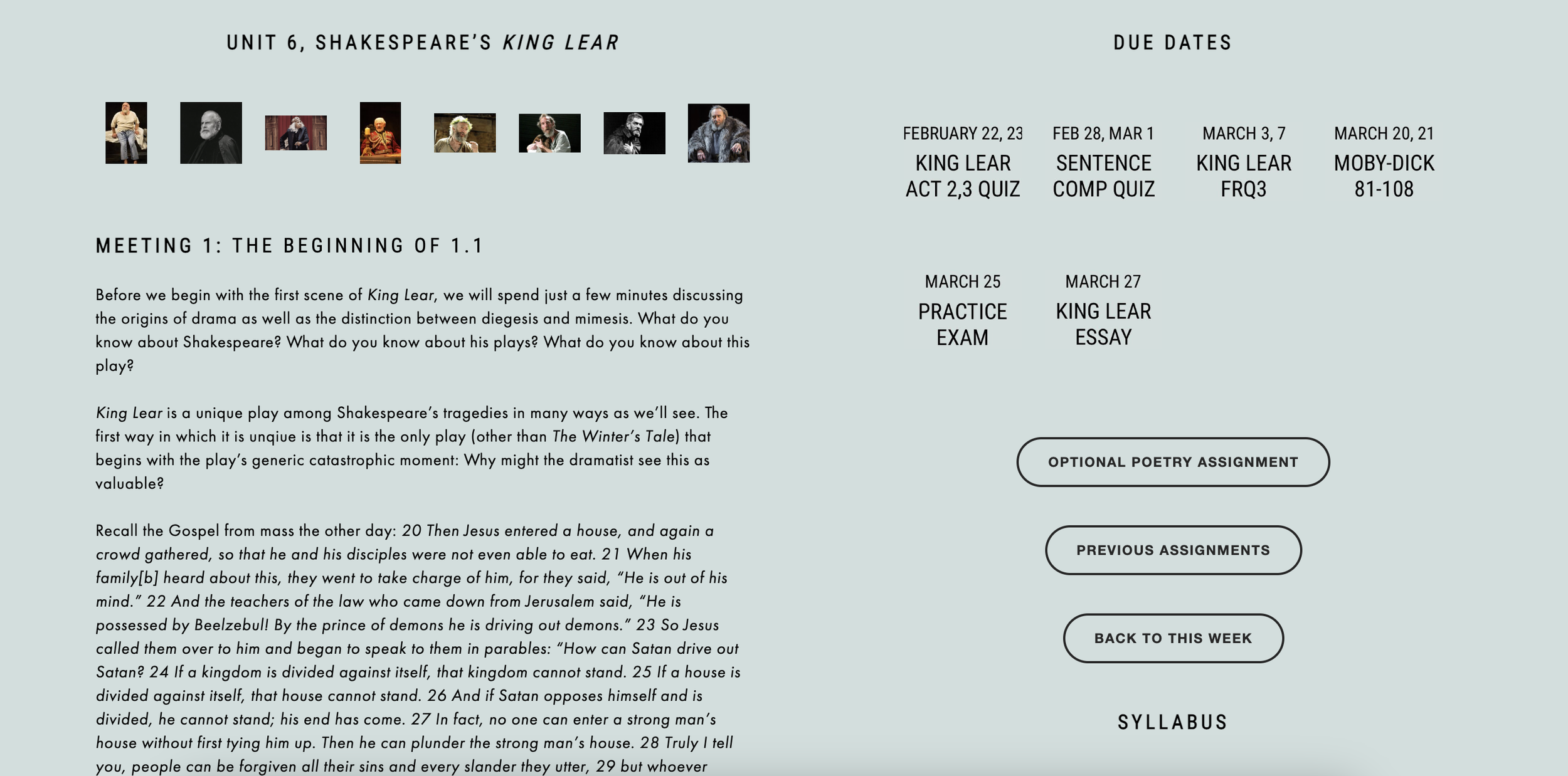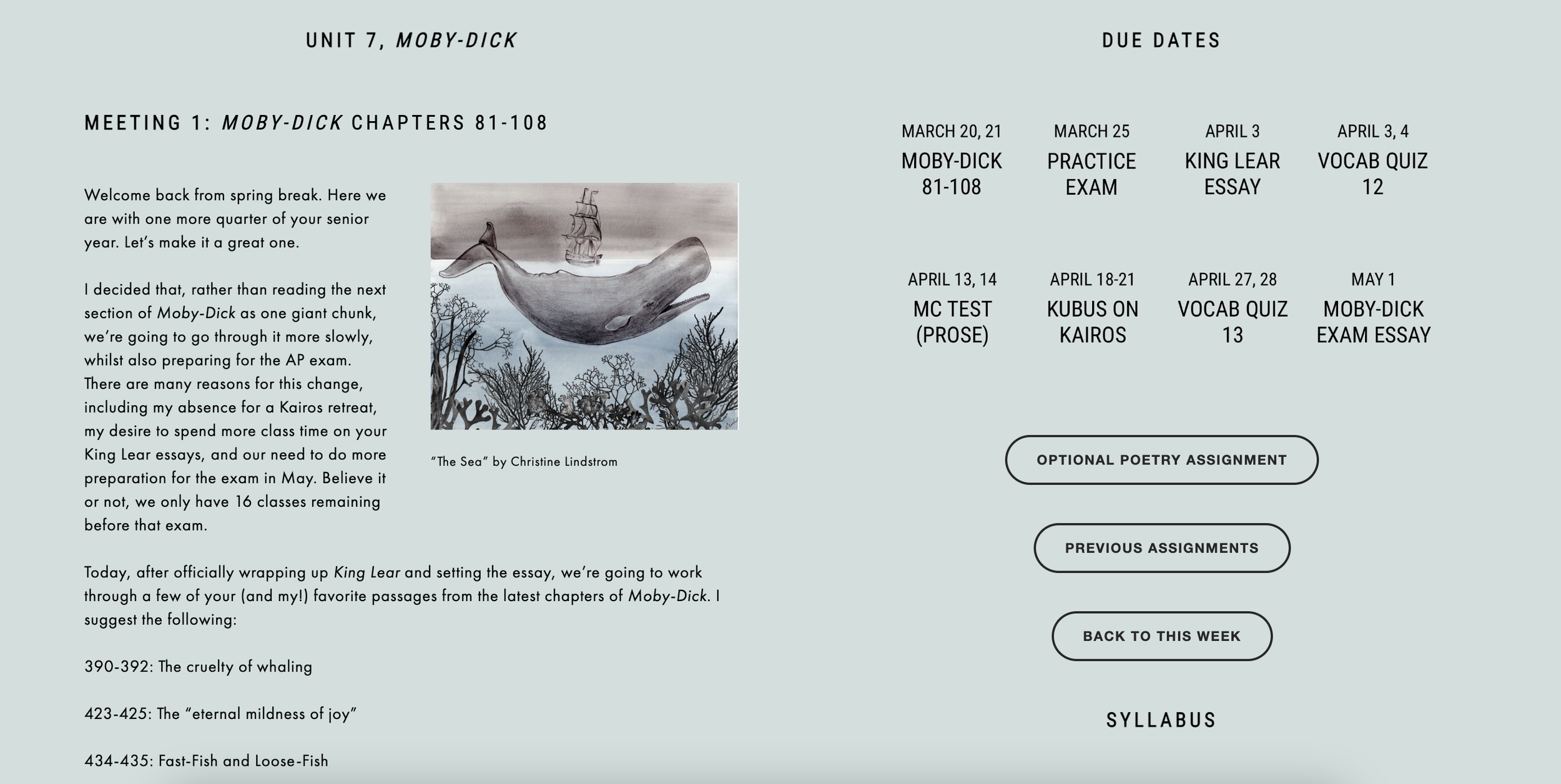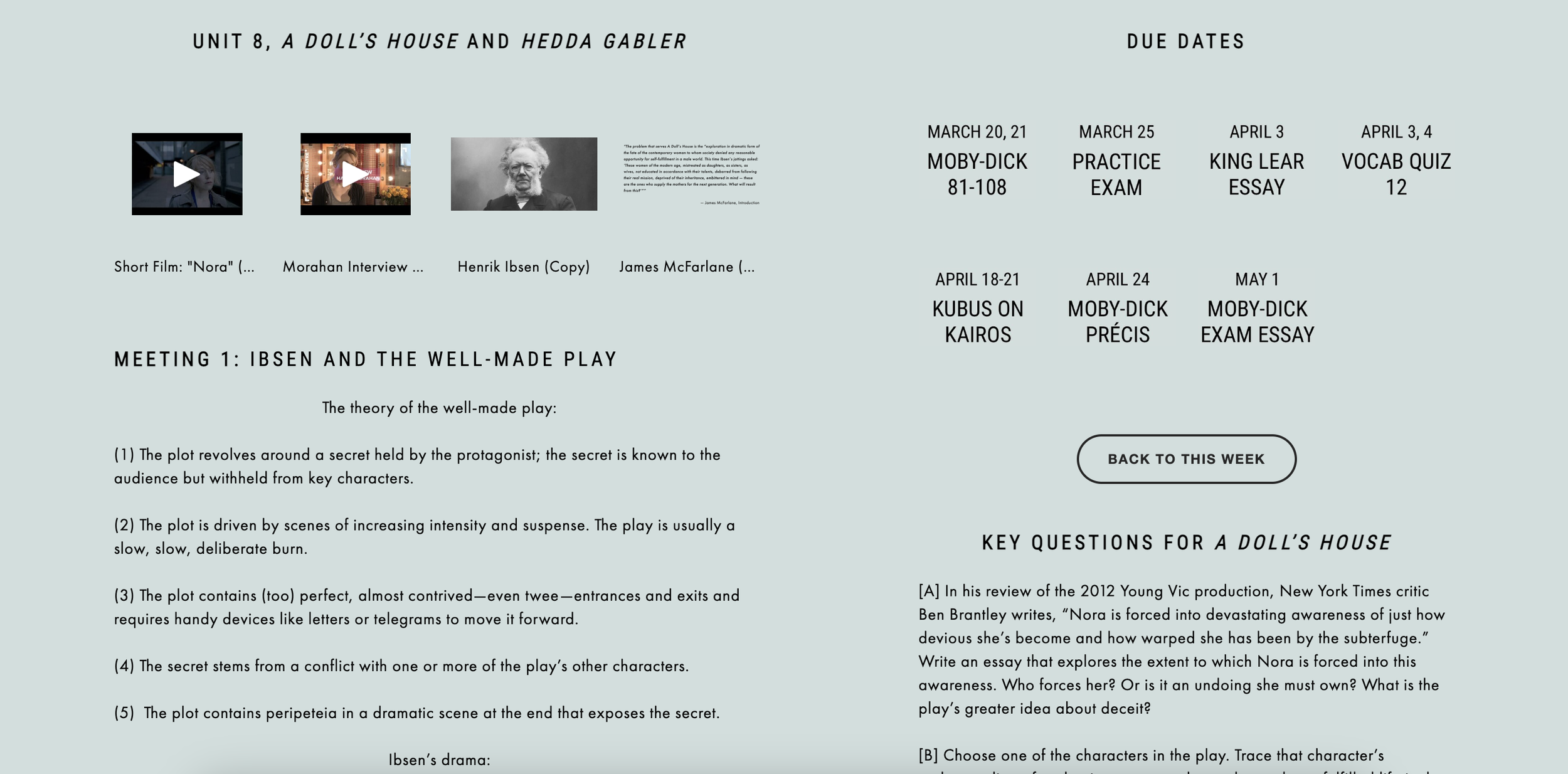unit 5: war and peace
MEETING 16: pierre, l’russe besuhof, arithmetician
We’ll begin with your quiz.
Then, in discussion, we have quite a lot of ground to cover: How does the novel become something completely new in chapter 1? How are Andrei and Natasha coping with what has recently happened? How is Natasha moved by the Russian Orthodox service she attends? Does that scene remind you of any other moments in the novel? Pierre, the numerologist??? Why does Tolstoy pair religious belief with numerology in back-to-back chapters? What do you think is Tolstoy’s purpose in the scene with Petya, now a young man?
To conclude, I have two sample FRQ2s for us to evaluate together.
Homework: Read Book Three, Part Two, Chapters 1-8, Pages 732-771.
MEETING 17: farewell to the old prince
During today’s class, we’ll work back to a couple moments from our last reading before focusing on chapters 5 and 8 from the most recent section. We, of course, say goodbye to the first of our main characters. How do we leave him? How does Marya leave him? What kind of an effect does her father’s death have?
During our next class you’ll write your first FRQ digitally. Bring a charged device, laptop preferred if at all possible. iPad will work, too. The passage, which you will not have seen before, will be on paper, and you’ll have scrap paper to plan, but you’ll type your response in a pre-formatted MLA doc. Have it ready when you arrive. Oh, and we’re going down to 50 minutes. Oh, and Row C now counts.
To do one final preparation, I have the 2007 FRQ2 prompt for us to look at together. It’s actually a great selection from a Dalton Trumbo novel Johnny Got His Gun.
Homework:
The work below will be due for blocks 1, 2, and 3 on Tuesday, February 17, and for blocks 6, 7, and 8 on Wednesday, February 18. During the two intervening class, you’ll write your FRQ2 (prose analysis) and we’ll debrief and score them together using a comparative grading system.
(1) Read the summary for Book Three, Part Two, Chapters 9-12; read Book Three, Part Two, Chapters 13-14, Pages 784-792; read the summary for Book Three, Part Two, Chapters 15-20; read Book Three, Part Two, Chapters 21-29, Pages 816-845.
(2) Before undertaking our next reading, watch Epic History’s introduction to the Battle of Borodino. The context will be helpful.
(3) Read Book Three, Part Two (the never-ending part?), Chapters 30-39, Pages 846-880. Good luck with the battle. Brace yourselves.
MEETINGs 18/19: andrei, prince of... denmark? / farewell, moscow
Key moments from the latest reading:
Nikolai and Marya: If you look closely at chapters 13 and 14, what does the narrator want us to see about their blossoming attraction to one another? Focus on 787 and 791-2.
Pierre and Dolokhov: Does their reconciliation seem sincere? Can it undo so simply all the strife that came before?
Pierre and Andrei: What famous literary character is Andrei emulating in Chapter 24? Why might Tolstoy have given us this allusion? Please note the hilarious way Pierre arrives in Chapter 24. Tolstoy truly is a genius. What kind of new Andrei do we get in chapter 25? We can focus on the amazing pages 832-833. Now does the Dolokhov scene make more sense?
How should we compare Napoleon to Kutuzov as generals? As people?
We’ll close by considering the astonishing chapter 37.
Homework:
Read the summary for Book Three, Part Three, Chapters 1-11, Pages 881-911. Read Book Three, Part Three, Chapters 12-24, Pages 911-951.
MEETINGs 20/21: “the unsettled question of life and death”
We did it. We made it to the moment when the end of this novel begins. Yes, we still have nearly a full-length novel to go, but everything from here is the most satisfying several hundred pages of resolution that I know. Enjoy it: you earned it!
In each of our final classes, I’ll fold into the conversation a discussion question that addresses the novel as a whole. Here’s our first: What are the human qualities that Tolstoy most highly values, and which characters seem to exemplify them most fully? Which characters, and which forms of human behavior, particularly stir Tolstoy’s anger or contempt?
Homework: Read Book Four, Part One, Chapters 1-12, Pages 1005-1045. You’ll have a Book 3 quiz in our next class.
MEETING 22: pierre and nikolai learn to pray
Today we’ll discuss the latest reading, which includes one of my favorite scenes, which contains one of my favorite characters, the latest in a long line of figures who capture Pierre’s attention. What’s different this time?
What does Tolstoy ask us to see between Marya, Nikolai, and Sonya?
Homework: Read Book Four, Part One, Chapters 13-16, Pages 1045-1061 + ¶ 1 on page 1062. Enjoy yet another of the novel’s climaxes. Then read the provided summary of Book Four, Part Two and Book Four, Part Three, Chapters 1-11. By our next class, you should be through page 1138.
MEETING 23: “the simple and solemn mystery of death”
1045: “For a long time Pierre did not sleep, but lay with eyes open in the darkness listening to the regular snoring of Platon, who lay beside him, and he felt that the world that had been shattered was once more stirring in his soul with a new beauty and on new and unshakeable foundation.” Pierre’s in a hopeless situation and finds such hope. Why? Characterize Platon’s outlook and explain why it helps Pierre. Why is Platon the personification of “everything Russian”?
1058: “Love hinders death. Love is life. All, everything that I understand, I understand only because I love. Everything is, everything exists, only because I love. Everything is united by it alone. Love is God.” Every major character but one converges in chapters 14, 15, and 16: How does Andrei’s death affect each of them? Which moment do you find most touching? Is this the climax of the novel? Do you see any of the questions Tolstoy has been asking being answered in this chapter? What exactly happens to Andrei in his final days?
Do you understand Princess Marya and Natasha’s reaction at the end?
How many of you were reminded of Ivan Ilyich? What’s the same?
At the end of class, we’ll read together Tolstoy’s recounting of the death of Petya.
Homework: Read Book Four, Part Three, Chapters 12-19 and Book Four, Part Four, Chapters 1-12, Pages 1139-1189. Look ahead at the schedule. Just keep reading if you can. Read, read, read.
MEETING 24: at pierre’s feet
We’ve reached another of the novel’s satisfying conclusions and will spend the majority of our class focused on a single chapter. Any guesses?
How does the chapter illuminate any confusion or lingering questions you have about the novel?
At the end of class, I’ll introduce your final War and Peace essay.
Homework: Read Book Four, Part Four, Chapters 13-20, Pages 1189-1212. If you’ve not been his biggest fan, these chapters will make a Tolstoy fan out of each and every one of you. Enjoy Part Four’s final chapters.
MEETING 25: pierre and natasha
1194: “[I]t was still the Moscow it had been in August. All was destroyed, except something intangible yet powerful and indestructible.”
1206: “With such masters one can live.”
Has Tolstoy maintained control over Pierre and Natasha’s relationship from the beginning? How do you react to their ending? Does it make sense? Why, or why not?
In the second half of class we will brainstorm a research topic together and work through 3 War and Peace FRQ3s.
Homework: Read Epilogue, Part One, Chapters 1-16, Pages 1212-1269. Skip chapters 2-4 if you’d like. Pick your topic; start a doc; write a hypothesis for your War and Peace essay. Have it ready for after spring break.
———
MEETING 1: ALL’S WELL THAT ENDS WELL
Timm, “Decembrists at Peter’s Square”
Today begins an ambitious new project. My hope is that everyone is rested and ready to go; I look forward to undertaking this with you.
What is War and Peace? How do you read it? Let’s start with a little background on the author himself before moving to the opening 6 chapters.
Who were the Decembrists? How did Tolstoy come to write about the generation of his grandparents when he had originally planned to set the novel in 1858?
What kind of a place is the ballroom of Anna Pavlovna Scherer? What are your initial impressions of some of the first characters we meet? What do you make of Andrei, the opening’s most enigmatic character? And Pierre? How does Tolstoy seem to build human beings rather than characters?
Homework: Read Book One, Part One, Chapters 7-15, Pages 37-66 during which you’ll first be introduced to the Rostovs.
MEETING 2: Carlyle and Schopenhauer
In his lecture series “On Heroes, Hero-Worship, and the Heoric in History,” Thomas Carlyle, states, “The History of the world is but the Biography of Great Men… Universal History, the history of what man has accomplished in this world, is at bottom the History of the Great Men who have worked here. They were the leaders of men, these great ones; the modellers, patterns, and in a wide sense creators, of whatsoever the general mass of men contrived to do or to attain; all things that we see standing accomplished in the world are properly the outer material result, the practical realisation and embodiment, of Thoughts that dwelt in the Great Men sent into the world: the soul of the whole world's history, it may justly be considered, were the history of these.”
Tolstoy responds, “In historical events great men-so called-are but the labels that serve to give a mane to an event, and like labels, they have the last possible connection with the event itself. Every action of theirs, that seems to them an act of their own free will, is in an historical sense not free at all, but in bondage to the whole course of previous history, and predestined from all eternity.”
Who do Pierre and Andrei agree with so far in the novel? Do they think that one individual can bring about great change?
Schopenhauer takes it a step further. To paraphrase, Schopenhauer argues that history is not made to happen by tsars or great kings or generals or great thinkers or great men but is made to happen by infinitely many actions by billions of people.
Let’s turn to the Rostovs.
Homework: Read Book One, Part One, Chapters 16-21, Pages 66-93.
MEETING 3: russian names and the death of count bezukhov
What’s the best sentence, paragraph, or short selection in this section? Why?
The bulk of today’s chapters concern the death of Count Bezukhov and the behind-the-scenes scheming of Katishe, Vasili Kuragin, and Anna Mikhailovna Drubetskaya. What is each trying to achieve, as far as you can tell? Is Pierre completely oblivious as to what’s happening and to what happens to him once the old Count dies?
Why do you think Catherine the Great makes so many appearances in this section? Are we meant to think about her presence and the dying Count’s association with her?
Homework: Read Book One, Part One, Chapters 22-25, Pages 93-118.
MEETING 4: farewell, andrei. dieu sait quand reviendra.
An icon similar to the one Marya gives to Andrei
In the latest section, we’re introduced to the remaining principal characters of the novel, Prince Nikolai Bolkonsky, Marya Bolkonskaya, and Madame Bourienne. Let’s finish our initial characterizations of the main figures with the these three. If you wanted to tell someone about the Prince or Marya, what would you say? Those students in charge of those characters should take us to a few passages.
Your reaction to the letters? I think they’re insipid, but we do learn a few interesting details of plot we need to discuss.
Chapter 25 is a treasure trove. We will use it to practice prose analysis and thesis construction.
“Against your will He will save and have mercy on you and bring you to Himself, for in Him alone is truth and peace.”
If we have time at the end, we’ll practice one more prose MCQ set.
Homework:
Priorities for the Impending Perennial Protracted Pause:
(1) Have a very Merry Christmas! Enjoy the time with family and friends. Rest!
(2) While you do not have to watch the excellent video to the right in order to understand fully the events of Parts Two and Three of Book One, it will definitely help. Watching the video about the Battle of Austerlitz, often dubbed Napoleon’s masterpiece, will make following the events of these pages much easier. Set aside 16 minutes and watch before you begin reading.
Map-lovers, historians, you might find these helpful:
(3) Read Book One, Parts Two and Three, Pages 119-313. Break it up into small parts. Be disciplined! Use your resources: the website, the reading guide, the chapter guide. Gents, there will be an assessment after each of the 5 Books. Be ready. You can do this. Part Two might drag; Part Three will move.
MEETING 5: book one: the forest
By Unknown. Drawing is signed in lower left corner: "Ten Eyck, NY"
Welcome back. What’s the password?
Let’s begin on page 274. What’s Tolstoy setting into motion with the image of the clock? How does the image help us understand Tolstoy’s view of history? Are the events of Book One consistent with this view of history?
If what the figure of the clock suggests is true, it’s no wonder to me that so much of Book One has been about characters trying to find their footing in a complicated world. Pierre, Andrei, Nikolai, Marya, Natasha all search for stability in some way. What does that search look like?
Tolstoy’s view of history is just one of the big ideas the novel explores in the opening Book. What are some of the others? Let’s begin to compile a list.
Today is all about a macro understanding of the novel’s opening Book. Tomorrow we’ll zoom into the minutiae to perform a micro study of some of the Book’s important moments.
What or who is being compared in the novel?
Homework:
(1) Read through my riffs on the latest chapters. Choose 3 and return to them. Be prepared to comment on a few of them.
(2) Come to class with a single detail or a single figure or a single image or a single symbol that you find compelling for a particular reason.
(3) Short quiz next class.
MEETING 6: book one: the trees
Before a quick quiz, we’ll work through as many moments in Parts Two and Three as we can. What’s to come of some of the main characters in the near future?
Homework: Read Book Two, Part One, Chapters 1-6, Pages 317-343.
MEETING 7: Pierre, hélène, and dolokhov
Up for discussion today:
Book Two begins with a Nostoi. How are things different for Nikolai? He hasn’t been gone that long. Why such a change?
What’s Natasha’s most dominant characteristic?
Pierre, the bear: from “I challenge you!” to “Folly… folly! Death… lies…”
Dolokhov, the brawler, Dolokhov, the bully: What do you make of the narrator’s decision to add the detail about Dolokhov’s old mother and hunchback sister at the end of chapter 5?
Pierre’s decision to renounce his title and to give “his wife” full power and control of his estates is beyond foolish. Can we make sense of it?
Around the room you’ll find 4 quotations with a detail, a symbol, a figure, or an image. We’ll work through the first one together. Then, in small groups, you’ll do likewise with another. Here’s your first major-grade assignment of the semester.
Homework: Read Book Two, Part One, Chapters 7-16, Pages 343-370.
MEETING 8: life and death
We’ll start today with a quick quiz. 5 questions. Spin the wheel.
Back to Bald Hills. Yet another Nostoi. How does Andrei’s compare to Nikolai’s in tone? How does Marya compare to Natasha in the previous section?
Why do you think a scene of death is coupled with a scene of birth?
Dolokhov and Sonya / Denisov and Natasha ?
We’ll consider the detail of Dolokhov’s hands on 361-4 and look at a student response from last year.
Homework: Read Book Two, Part Two, Chapters 1-7, Pages 371-394.
MEETING 9: pierre and the masons
Before our in-class assignment, we’ll begin a discussion of the latest section. Whatever we don’t finish, we’ll combine with our next reading and discussion.
A key quotation to get us started today:
“He had been engrossed by the same thoughts ever since the day he returned from Sokolniki after the duel and had spent that first agonizing, sleepless night. But now in the solitude of the journey they seized him with special force. No matter what he thought about, he always returned to these same questions which he could not solve and yet could not cease to ask himself. It was as if the thread of the chief screw which held his life together were stripped, so that the screw could not get in or out, but went on turning uselessly in the same place.”
In what state does the Mason find Pierre? What’s your reading of the Mason’s intentions? Why is the idea of a rigorous perfecting of oneself appealing to Pierre?
Sift through what the Mason says. Wherein lies genuine wisdom and wherein lies emptiness? Is the Mason giving Pierre bad advice? Why does everybody want to blind Pierre? Turn to page 384.
Are there characters who seem to be revising their own personal histories? Which ones? How so?
In-class Assignment to conclude class
Homework: Read Book Two, Part Two, Chapters 8-14, Pages 394-422 + my summary of chapters 15-21. If you have time and interest, Chapter 21 is also worth the read.
MEETING 10: pierre and andrei, part 2
At the beginning of class today, I’ll set your next vocabulary and sentence composition assignment.
In Book Two, Part Two, Pierre and Andrei both seek salvation but in different ways: Recall Pierre on 384; now compare that to Andrei on 403. This contrast reaches a climax on 415. We’ll put 415 to 417 on the board and perform a close reading on the section.
Homework: Read Book Two, Part Three, Chapters 1-11, Pages 447-478.
Book Two, Part Two, in my opinion, ends the beginning of the novel, and Book Two, Part Three begins what is to my mind the heart of the novel. When we began, we were in 1805; now we’re in 1809, in the middle of the truce between Alexander and Napoleon, in the middle of Andrei’s, Pierre’s, and Nikolai’s wrestling with purpose, and at the beginning of Natasha’s emergence into adulthood. What follows in the next 250 pages or so is an extraordinary episode of the larger story that culminates in the appearance of one of the novel’s climaxes and the novel’s central symbol, The Great Comet of 1812.
MEETING 11: andrei meets natasha
Before returning to War and Peace today, we’ll work through a few “randomly chosen” samples from the writing assignment last week to work through together.
Book Two, Part Three begins what is to my mind the heart of the novel. When we began, we were in 1805; now we’re in 1810, in the middle of the truce between Alexander and Napoleon, in the middle of Andrei’s, Pierre’s, and Nikolai’s wrestling with purpose, and at the beginning of Natasha’s emergence into adulthood. What follows in the next 250 pages or so is an extraordinary episode of the larger story that culminates in the appearance of one of the novel’s climaxes and the novel’s central symbol, The Great Comet of 1812.
447: A thesis of the novel?
448-449: A conversation with an oak tree?
Compare 449 to 451
452: A key Andrei paragraph
464: The bog of Masonry
468-475: Why, Pierre, why?!
475: An inscrutable dream
For whom is there more hope at this point in the novel, Pierre or Andrei?
Homework: Read Book Two, Part Three, Chapters 12-26, Pages 479-521.
MEETING 12: andrei and natasha; pierre’s heart of gold
Tell me first about your response to the reading. How believable is the relationship between Andrei and Natasha? How does it differ from the other moments of love that we have seen?
Passages for discussion:
488: “Natasha looked in the mirrors and could not distinguish her reflection from the others. All was blent into one brilliant procession.”
492-3: Why is our narrator comparing Natasha to Helene? Strange.
500: With what has Natasha provided Prince Andrei?
508: What does Tolstoy give us to better understand our reactions to Andrei and Natasha?
512-3: What does this one-year delay portend?
515: An important exchange given what is to come
Homework: Read the summary for Book Two, Part Four, Chapter 1-6. Then read Book Two, Part Four, Chapters 7-13, Pages 544-573. Nolan Aufdenspring, Ethan Zhao, Kyle Prati, Titus Tran, Joaquin Arroyo-Cruz, and Dario Contreras will lead the (graded) discussion.
MEETING 13: natasha’s dance, the soul of the novel
First, compare Uncle’s house to both of the Rostov’s estates. What are some of the key details that make it distinct from the other settings we’ve seen so far?
Let’s then compare 548-9 to the waltz between Natasha and Andrei. Do the think the first full paragraph on 549 is overstating the significance of her dance? What do you think Tolstoy wants us to see?
550-1: The end of childhood for Nikolai and Natasha?
From Tolstoy, “What is Art?”:
“The business of art lies just in this—to make that understood and felt which, in the form of an argument, might be incomprehensible and inaccessible.”
“Art is not, as the metaphysicians say, the manifestation of some mysterious idea of beauty or God; it is not, as the aesthetical physiologists say, a game in which man lets off his excess of stored-up energy; it is not the expression of man's emotions by external signs; it is not the production of pleasing objects; and, above all, it is not pleasure; but it is a means of union among men, joining them together in the same feelings, and indispensable for the life and progress toward well-being of individuals and of humanity."
"We are accustomed to understand art to be only what we hear and see in theaters, concerts, and exhibitions, together with buildings, statues, poems, novels. . . . But all this is but the smallest part of the art by which we communicate with each other in life. All human life is filled with works of art of every kind — from cradlesong, jest, mimicry, the ornamentation of houses, dress, and utensils, up to church services, buildings, monuments, and triumphal processions. It is all artistic activity. So that by art, in the limited sense of the word, we do not mean all human activity transmitting feelings, but only that part which we for some reason select from it and to which we attach special importance."
"To take the simplest example: a boy, having experienced, let us say, fear on encountering a wolf, relates that encounter; and, in order to evoke in others the feeling he has experienced, describes himself, his condition before the encounter, the surroundings, the wood, his own light-heartedness, and then the wolf's appearance, its movements, the distance between himself and the wolf, etc. All this, if only the boy, when telling the story, again experiences the feelings he had lived through and infects the hearers and compels them to feel what the narrator had experienced, is art."
Homework: Read Book Two, Part Five, Chapters 1-10, Pages 574-608.
MEETING 14: a night at the opera
It’s 1811, nearly 1812. Andrei and Natasha’s engagement is well into its 6th month at the beginning of our section. Tolstoy pivots to Pierre with a great opening sentence: “After Prince Andrei’s engagement to Natasha, Pierre without any apparent cause suddenly felt it impossible to go on living as before” (574). Let’s start with that sentence in light of our previous class’s final comments on the omnipresent Pierre.
I have you arranged in small groups today. Each group will revisit 5 key chapters from the latest reading. What’s the best question to ask about each chapter? What are some of the key ideas?
1: Pierre’s despair
2: Marya’s loneliness
7: Natasha and Marya
9: The weaving narrative of the opera
10: Natasha and Anatole
Homework: Read Book Two, Part Five, Chapters 11-22, Pages 608-644. Whereas I don’t have a favorite chapter or a favorite section necessarily, this reading contains some of the most compelling internal conflict and one of the most moving scenes in the novel. That’s just one man’s opinion. I hope you find the time to savor the last few chapters.
MEETING 15: the comet of the year 1812
The Great Comet of 1811 on October 15, 1811, from Otterbourne Hill near Winchester, England.
To begin our discussion of the most recent section, turn to a neighbor and respond to either one of the following directives: (1) “Defend Natasha.” or (2) “Defend Anatole.”.
Let’s look very closely at the Book’s final chapter. What do you think happens to Pierre in this scene? What might the comet of 1812 be symbolic of?
I have a quick recap of Book 2 on the board. What connections do you make when you see all of its events at once? Let me throw a few big ideas in your direction. Do you agree? Disagree?
Consider this “big issue” question: From where does happiness come, according to the novel? From within or from without?
At the end of class, we can read and score together two of the FRQ2’s from the exam in December. We’ll do this to prepare for your next FRQ2, which is next week.
Homework:
(1) Before undertaking our next reading, watch Epic History’s introduction to Napoleon’s invasion of Russia in 1812. The context will be helpful for the next few readings.
(2) Read Book Three, Part One, Chapters 1, 8, and 16-23 (and intervening summary), Pages 647-650, 672-677, and 703-731.






















